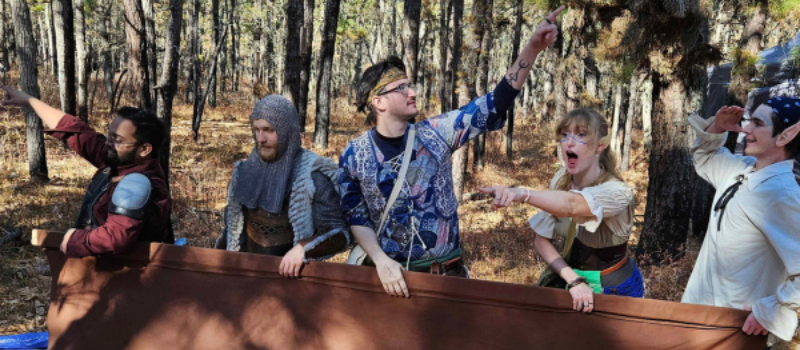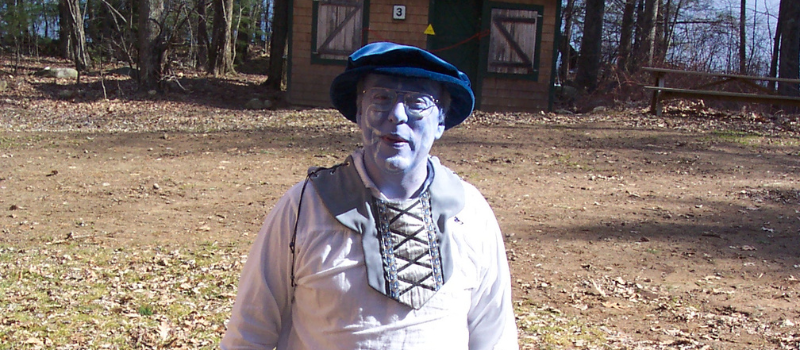How To Start a New LARP Part 3
Staffing Your LARP - How To Build a Core Team

Introduction
One of the hardest things about running a LARP is recruiting and retaining the right staff. In this blog we explore the strengths your team needs to run a successful LARP and the importance of group dynamics and time management. Again, we have leaned very heavily on our panel of owners and GMs for their advice and wisdom.
Required Skill Sets
For a LARP to be successful it is important that your core team excel in 5 key areas:
1. One or more of your core team must be a great storyteller
A great storyteller understands that the story lives through the players, not just in their own imagination. They build a world rich enough for others to shape, rather than one that only follows a predetermined script. The LARP storyteller knows how to set scenes that inspire action and encourage emotional stakes. They’re flexible: they give character agency, so when players make unexpected choices, a great LARP storyteller adapts, weaving those actions back into the narrative instead of forcing the original plan. They communicate clearly and fairly, making rules and consequences understandable without breaking immersion.
Most importantly, your storyteller must care about the experience of the group. Their success is measured not by how closely the LARP follows a plot, but by how meaningful, memorable, and shared the story feels to everyone involved.

2. Your team needs Business/Finance experience
Starting a LARP doesn’t require a degree, but having key business and financial experience makes success more likely. These 4 points, while not an exhaustive list, highlight what our experts shared as the most important.
-
Budget and Cashflow: Understanding basic budgeting and cash flow is essential—you need to track how money comes in and goes out, and make sure expenses don’t exceed revenue.
-
Marketing: It’s important to know how to identify and reach your customer effectively.
-
Legal: It’s also useful to understand legal basics, like business structures, contracts, and tax responsibilities. One owner shared some words of wisdom, “Ensure that expenses are incurred in the same period as any related revenue”. For example, if you raise money to start a game (i.e a GoFundMe campaign) in one calendar year but your expenses are in the following year, you could have an unintended tax implication.
-
Leadership: Finally, some basic leadership and operational skills help keep things organized, while problem-solving and adaptability help you handle challenges and increase your chance of building a sustainable LARP business.
3. Staff needs experience managing player experience
Managing player experience requires a mix of communication, observation, and emotional awareness.
Your staff needs strong listening skills so players feel heard and valued. You need to understand what they enjoy, what frustrates them, and how to keep the environment fun and engaging. Players need to know expectations, rules, and boundaries without feeling controlled. Be observant; you should be able to read group energy, notice when someone feels left out, and step in before problems escalate. Conflict resolution and fairness are also key—assign someone competent at addressing issues calmly, who will treat everyone consistently, and avoid favoritism. Player dynamics can change quickly, so it needs to be someone who can adapt and adjust pacing or tone when necessary. Finally, empathy ties it all together. When you genuinely care about player experience, and build player trust, people feel safe participating, and the entire group benefits.
4. Prioritize one or more Rules Experts on your team
A LARP rules expert adds significant value to your team from initial policy and skill development to keeping the game running smoothly and fairly. Your rules expert needs a deep understanding of the system to help prevent confusion, disputes, and interruptions during play.
They should be able to explain mechanics clearly, translate complex rules into practical guidance, and ensure players know how to use their abilities effectively. When unexpected situations arise, rely on your rules expert to make quick, informed decisions that maintain balance without breaking immersion.
Expertise in rule design ensures rules are consistent and fair, reduce the learning curve for new players, and create a more enjoyable, inclusive, and sustainable play environment—where story, creativity, and character immersion can thrive.

5. Include at least one Administrator/Logistics expert
Administration and logistics describe the expertise I have brought to many games, so it was very gratifying to have 100% consensus that this is a required core team need.
Starting and running a LARP involves many logistics. Event planning, registrations, housing, food, schedules, props, costumes, technology, and campsites are just categories of hundreds of tasks that require coordination. Without strong logistics, even the most exciting story can fall apart. Someone with logistics skill ensures that materials arrive on time, spaces are rented and prepared, and players know where they need to be. They manage sign-ups, registrations, read player feedback, and assign points.
The head of logistics also plans for contingencies—weather changes, missing items, or unexpected turnout—and because immersion is the LARP goal, they seek to solve problems quickly without disruption. Good logistical planning helps avoid stress and confusion, allowing players and storytellers to focus on roleplay. Ultimately, logistics expertise creates the structure that supports creativity. When the practical details are handled smoothly, the LARP world is more enjoyable for everyone involved.
Group Dynamics

Rob Ciccolini (Madrigal) said group dynamics is one of the most critical aspects of running a game and Dan Comstock (Drachenfest-US) shared this advice, “Your core staff is the nucleus of your game. Build it with care.”
Successful group dynamics depend on clear communication, shared expectations, trust, and respect among members. Everyone needs to understand the group’s purpose and their role within the team. When goals are aligned, cooperation comes more naturally. Clear communication prevents misunderstanding and reduces conflict—people should feel safe expressing ideas and concerns without judgment. Trust is built when individuals follow through on commitments and treat others fairly. Respect means acknowledging different perspectives, listening actively, and valuing contributions, even when opinions differ.
Effective groups also need balanced participation: no single voice should dominate, and quieter members should be encouraged to speak. Good conflict resolution skills are essential, since disagreements will happen. Flexibility and adaptability help the group adjust when circumstances change. Finally, a positive, fun, and supportive atmosphere boosts motivation. When people feel included and appreciated, they’re more likely to stay engaged and work well together.
Time Management
Staffing and running a LARP is a large time investment. It’s important as staff to consider work-life balance and family/LARP balance. Everyone we spoke with stressed how much running a LARP was like having another job. Everything takes more time than you think it will. The week before an event is stressful, so Michelle Mangio’s (Cottington Woods) advice is to not over-commit. Always plan more time. It’s harder to do when you are balancing the goal of delivering a great player experience.
Mike Goulston (Cosmic Symphony) shared that setting expectations and using a plan with dates is helpful, and that what helps his team keep more on track is having face-to-face meetings.
Suggestions for all LARP Teams:
-
Plan, prioritize, and stay focused for effective time management.
-
Start by identifying and scheduling the most important tasks.
-
Break large projects into smaller steps to make progress more manageable.
-
Use shared calendars, task lists, and planners to stay organized.
-
Set realistic deadlines and avoid multitasking - (try Mike’s face-to-face suggestion)
-
Review your progress regularly and adjust your plan as needed.
Closing
This blog continues our series on Starting a LARP. The series is targeted at players considering running a LARP, but we hope that it is useful for all players, even those that stumble upon it searching for “What is LARP?”
Part 3 summarized the advice on how to staff your core team. It provides details on the skill sets needed and the importance of group dynamics and time management. We featured advice from Rob Ciccolini, Mike Goulston, Michelle Mangio, and Dan Comstock, just a few of our expert panel. As the series unfolds, we will share more pointers and advice from our experts.
- Part 1: The Top 5 Considerations When Starting a LARP
- Part 2: The 6-Step Process to Starting a LARP – From Idea to Event
- Part 3: Staffing Your LARP – How To Build a Core Team
- Part 4: The Creative Side of LARP – What Story Do You Want To Tell
- Part 5: The Business Side of LARP – Pointers From the Experts
- Part 6: The Logistics Side of LARP – A Checklist for Success
Call to Action
Check out our previous blogs in the series Part 1 and Part 2, and reach out if you have advice, stories, or feedback about this article. We’d love to hear from you. Please reach out to us at blog@larportal.com.
If you are a game owner or thinking about starting a game, let LARP Portal simplify your administrative processes and give you and your players more time for LARPing. Contact us at demo@larportal.com today for a free demo.
If you would like to market your LARP and be listed in our Find a LARP search tool, contact us at support@larportal.com. This is a great tool for anyone who is searching for LARPs near me.
Latest Blogs




.png )




.png )

















